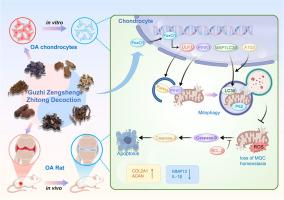FoxO1/PINK1/帕金森依赖性线粒体自噬介导骨脂增生止痛汤对骨关节炎的软骨保护作用。
IF 8.3
1区 医学
Q1 CHEMISTRY, MEDICINAL
引用次数: 0
摘要
目的:骨直增生止痛汤是治疗膝关节骨性关节炎的经典中药方剂,在中国临床得到广泛应用。鉴于叉头盒蛋白O1 (FoxO1)已被确定为OA治疗的潜在治疗靶点,本研究通过FoxO1介导的线粒体调节来研究GZZD的软骨保护作用,将传统医学与现代分子见解联系起来。方法:对GZZD对骨性关节炎的体内外治疗作用及软骨保护机制进行评价。采用关节内注射碘乙酸钠(monosodium iodoacetate, MIA)建立大鼠膝关节骨性关节炎模型,同时采用IL-1β刺激软骨细胞诱导体外骨性关节炎模型。组织染色、免疫组织化学和Western blot分析评估软骨保护作用。通过LC-MS/MS鉴定GZZD的血清成分,并通过转录组学和网络药理学探索GZZD介导的软骨保护的核心途径。检测关键蛋白表达,并应用分子生物学技术验证fox01及其下游通路在调节软骨细胞自噬、凋亡和线粒体功能障碍中的作用。此外,通过分子对接和分子动力学模拟来分析生物活性化合物与fox01的相互作用。结果:GZZD显著改善mia诱导的膝关节损伤,减轻软骨退化和软骨下骨破坏,降低OARSI评分。GZZD治疗显著降低血清促炎因子(IL-1β、IL-6、TNF-α)水平,同时增强软骨细胞的保护性自噬。此外,GZZD抑制软骨细胞凋亡和线粒体功能障碍,同时上调软骨基质蛋白COL2A1和抗凋亡蛋白BCL2,下调分解代谢因子(MMP13, IL-1β)。在机制上,GZZD激活FoxO1/PINK1/Parkin通路,恢复线粒体稳态,减轻线粒体依赖性凋亡,最终保护软骨细胞免受oa相关损伤。结论:本研究首次证实中药复方GZZD通过激活FoxO1/PINK1/Parkin通路,从而恢复线粒体功能,保护软骨细胞免受损伤,从而缓解骨关节炎。这些发现不仅确立了GZZD作为OA的一种有前景的补充疗法,而且为开发fox01靶向治疗提供了科学基础。本文章由计算机程序翻译,如有差异,请以英文原文为准。

FoxO1/PINK1/Parkin-dependent mitophagy mediates the chondroprotective effect of Guzhi Zengsheng Zhitong decoction in osteoarthritis
Objective
Guzhi Zengsheng Zhitong Decoction (GZZD) is a classic traditional Chinese medicine (TCM) prescription for treating knee osteoarthritis (OA), and has been widely used in clinical practice in China. Given that Forkhead box protein O 1 (FoxO1) has been identified as a potential therapeutic target for OA treatment, this study investigates the chondroprotective effects of GZZD through FoxO1-mediated mitochondrial regulation, bridging traditional medicine with contemporary molecular insights.
Methods
The therapeutic effects of GZZD on OA and its chondroprotective mechanisms were evaluated both in vivo and in vitro. A rat model of knee OA was established by intra-articular injection of monosodium iodoacetate (MIA), while an in vitro OA model was induced by IL-1β stimulation in chondrocytes. Histological staining, immunohistochemistry, and Western blot analyses were performed to assess cartilage protection. Serum ingredients of GZZD were identified using LC-MS/MS, and the core pathways involved in GZZD-mediated chondroprotection were explored through transcriptomics and network pharmacology. Key protein expression was examined, and molecular biology techniques were applied to validate the role of FoxO1 and its downstream pathways in regulating chondrocyte autophagy, apoptosis, and mitochondrial dysfunction. Additionally, molecular docking and molecular dynamics simulations were conducted to analyze interactions between bioactive compounds and FoxO1.
Results
GZZD significantly ameliorated MIA-induced knee joint damage, reduced cartilage degradation and subchondral bone destruction, and decreased OARSI scores. Treatment with GZZD markedly decreased serum levels of pro-inflammatory cytokines (IL-1β, IL-6, TNF-α) while enhancing protective autophagy in chondrocytes. Furthermore, GZZD inhibited chondrocyte apoptosis and mitochondrial dysfunction, accompanied by the upregulation of the cartilage matrix protein COL2A1 and the anti-apoptotic protein BCL2, along with downregulation of catabolic factors (MMP13, IL-1β). Mechanistically, GZZD activated the FoxO1/PINK1/Parkin pathway, restoring mitochondrial homeostasis and mitigating mitochondrial-dependent apoptosis, ultimately protecting chondrocytes from OA-related damage.
Conclusion
For the first time, this study demonstrates that the traditional Chinese medicine formula GZZD alleviates osteoarthritis by activating the FoxO1/PINK1/Parkin pathway, thereby restoring mitochondrial function and protecting chondrocytes from injury. These findings not only establish GZZD as a promising complementary therapy for OA but also provide a scientific foundation for developing FoxO1-targeted therapeutics.
求助全文
通过发布文献求助,成功后即可免费获取论文全文。
去求助
来源期刊

Phytomedicine
医学-药学
CiteScore
10.30
自引率
5.10%
发文量
670
审稿时长
91 days
期刊介绍:
Phytomedicine is a therapy-oriented journal that publishes innovative studies on the efficacy, safety, quality, and mechanisms of action of specified plant extracts, phytopharmaceuticals, and their isolated constituents. This includes clinical, pharmacological, pharmacokinetic, and toxicological studies of herbal medicinal products, preparations, and purified compounds with defined and consistent quality, ensuring reproducible pharmacological activity. Founded in 1994, Phytomedicine aims to focus and stimulate research in this field and establish internationally accepted scientific standards for pharmacological studies, proof of clinical efficacy, and safety of phytomedicines.
 求助内容:
求助内容: 应助结果提醒方式:
应助结果提醒方式:


